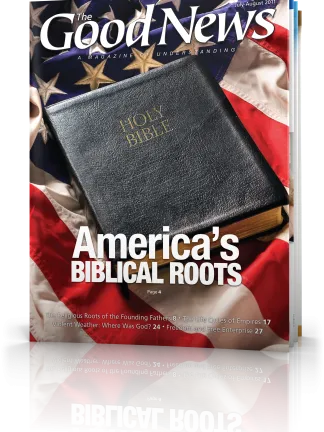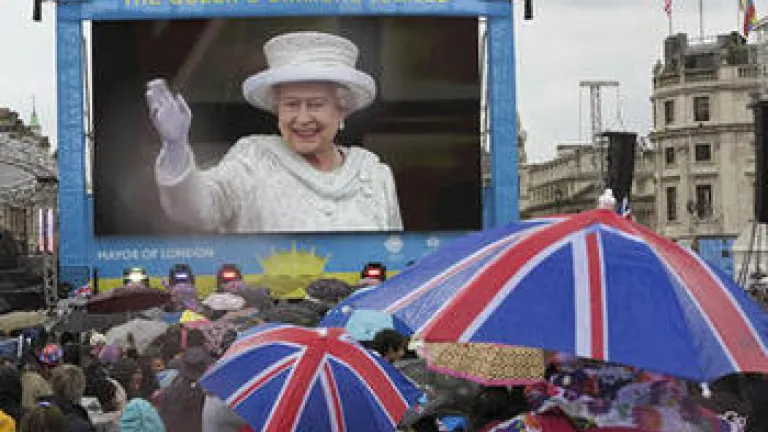Biblical Reflections on the Royal Wedding

On April 29, 2 billion people around the globe watched the wedding of Britain's Prince William and Kate Middleton. Why are so many people fascinated with the British royal family, and what is the biblical significance of this historic event?
The throne is secure.
That was the conclusion that I, a British native now living in the United States, came to while standing in London's Trafalgar Square on the day of the royal wedding, April 29, 2011.
Looking around at the thousands of people who filled the square, I was struck by how they were disproportionately young people. They were not all British. There was a significant Canadian and South African presence in the square, their national flags flying prominently (their respective high commissions are located there). I also heard a number of European languages being spoken around me.
When the Queen appeared on the giant television screen we were all watching, a great cheer went up. Earlier, similar cheers had risen for the bride, Kate Middleton, and her groom, Prince William. (In contrast, no such cheer arose at the sight of any of the country's politicians!)
I had not heard the British national anthem "God Save the Queen" sung in public for many years, but on this occasion I heard it sung with great fervor.
What is it, I pondered, that makes the British monarchy so resilient? The current dynasty will soon be celebrating its tercentenary—300 years on the throne.
When Queen Anne died in 1714 without any surviving children (she had given birth to many children, all of whom died young), the British searched diligently for the closest relative and found one in the Elector of Hanover, who became George I. The name was changed to Saxe-Coburg when Queen Victoria married Prince Albert; and changed again to an English-sounding name, Windsor, during World War I, when the British Empire was in conflict with Germany.
The last major royal tercentenary was in 1913, when the Russian royal family celebrated theirs. Wherever they went, crowds turned out in the tens of thousands to rejoice in three centuries of stability under the Romanov dynasty. Lenin wrote to his wife that there was no prospect of a revolution in his lifetime.
But just four years later the Romanovs were gone, the victims of a revolution that eventually led to Lenin taking over and those in the royal family all losing their lives.
An example of devotion to duty
Could we see a time when the House of Windsor no longer reigns?
An interesting statistic on the wedding is that while there were 5,400 street parties across the country celebrating the wedding, there were only four anti-monarchy street parties—not much for the Windsors to worry about!
Some commentators were critical of the cost, but even here there's no argument. The Queen, who doesn't even make the annual Sunday Times list of the top 500 wealthiest people in Britain, paid for the wedding itself. The British government paid for security—quite an expense, but easily offset by all the millions that were spent by tourists.
Most people visit Britain for its traditions and history, both of which are bound up in the monarchy. Remove the Queen and there wouldn't be anywhere near the number of visitors.
Why, though, were so many young people there? And why the cheers for an 85-year-old woman who could have retired years ago? Instead Queen Elizabeth II remains the head of state of 16 countries (the Commonwealth Realms) and is head of the 54-nation Commonwealth, an organization of former British colonies.
It's ironic that although she is a supreme political figure and one of the best-known in the world, after 60 years on the throne nobody knows anything about her political beliefs. This ability to stay out of and above politics is a major contributory factor to the longevity of the House of Windsor.
But it goes deeper than that.
The Queen is highly respected and deeply appreciated by peoples throughout the Commonwealth and beyond, even in a republic like the United States, where millions got up early on the wedding day to watch the ceremony live on a number of different television channels.
Cheers for the Queen and not for politicians?
A lot of it has to do with perceptions.
Whereas the Queen is famous for her dedication to duty, serving the people in a role from which there is no break, the politicians are perceived as largely self-serving!
A few days before the royal wedding, I was in South Africa, where I was reminded by an old friend that the royal family toured South Africa and Southern Rhodesia in 1947 as a thank-you for their contributions to the Allied war effort in World War II.
While in Cape Town, then-Princess Elizabeth had her 21st birthday on April 21. She spoke these words on that occasion: "I declare before you all that my whole life, whether it be long or short, shall be devoted to your service and the service of our great imperial family to which we all belong." She added: "God help me to make good my vow, and God bless all of you who are willing to share in it."
To the best of her ability she has lived up to this pledge throughout her life, which has turned out to be a long one.
She certainly could be faulted for presiding over the dismantling of the British Empire, weakening its various component parts—though in the aftermath of the long and draining Second World War it's hard to see how it could've turned out otherwise. She could also be faulted for signing the bill that took Britain into the European Union 40 years ago, an act that has compromised her and her nation's sovereignty. But nobody can fault her for a lack of service.
An example of service to others
Some years ago, I was watching a Canadian news channel. The Queen had opened parliament in London in the morning and had then flown to Regina, Saskatchewan, where she disembarked and met a long line of dignitaries before being driven off for other engagements. Her day was a very long 31 hours. For a woman who was then 80, that was quite remarkable.
There's a profound lesson of public service here for all Christians, a lesson that Jesus Christ taught us two millennia ago. Commenting on the constant power struggles and abuses of authority that were common in the Roman world, Jesus told His followers to be different: "Whoever wants to become great among you must be your servant, and whoever wants to be first must be your slave—just as the Son of Man did not come to be served, but to serve, and to give his life as a ransom for many" (Matthew 20:26-28, New International Version).
Christ-like service, fulfilling our duty to our fellow human beings, should be a priority in our lives.
Prince William seems to be following in his grandmother's footsteps, with a great sense of duty toward his future subjects. He actually works as a search-and-rescue pilot in the Royal Air Force. And concerning the broader British realm, whereas his father Prince Charles, next in line to the throne, seems disinterested in the Commonwealth, William visited Australia and New Zealand some months ago, returning to Australia immediately before his wedding to visit areas devastated by the recent floods.
He has also shown a great deal of interest in Africa, working with people in very difficult circumstances, including AIDS orphans. William and Kate's first overseas visit will be to Canada, the oldest dominion of the Commonwealth.
A taxi driver in London talked effusively the afternoon before the wedding as he drove me into London. A Kenyan Muslim, married to a Somali, he was clearly excited about the wedding and wanted me to know of the historic connections between his native country and the British royal family.
It was while visiting Kenya, he explained, then a colony of Great Britain, that Princess Elizabeth learned her father had died and she had become queen. It is also where Prince William proposed to his future bride. He continued to lament the ethnic divisions in Kenya, which exploded in appalling violence after the last election, and then criticized African leaders for corruption.
Having lived in Africa myself, I agreed that there is a great deal of corruption in some countries. His response was a quite voluble, "All of them—they are all corrupt!" Clearly, here was a man nostalgic for pre-independence Kenya! When one considers the economic decline in many of the countries that broke away from Britain, one must wonder how many others share his views.
Family and stability
The world has many systems of government, many of them very complex and difficult for the ordinary person to understand. Monarchy has an advantage in that it all comes down to family. In this case, one family has reigned for three centuries, providing a foundation of stability unrivalled in the modern world. It's all the more remarkable when we consider how much the world has changed over the last 300 years!
Growing up in a monarchy, everybody knows who the most prominent members of the royal family are and what their relationships are to each other.
In an age where family is constantly under attack and has been greatly undermined in recent years, people long for closer family ties. After the marital debacle of William's parents, there is a strong desire to see this marriage work—a union that all hope will produce children and hence continue the dynasty into the foreseeable future. In an age of global instability, people long for the extended stability of a 300-year-old dynasty.
Perhaps also there was among the crowd a nostalgia for the traditional family, which seems so elusive for the majority today.
The decline of the family in Britain and elsewhere has paralleled the decline in religious belief. That decline was quite obvious among those invited to the wedding. Commentators remarked at how many of the attendees were clearly unfamiliar with the hymns and uncomfortable in a church setting—perhaps attending a church service for the first time!
Ironically, at the same time the wedding was taking place, Westminster Abbey was hosting an exhibit commemorating the 400th anniversary of the King James Bible, the most influential book in British history.
Royal splendor is a precursor of a greater future wedding and reign
While one quarter of the world's people watched the wedding on television—an estimated audience of 2 billion—few understand that the splendor displayed on April 29 is nothing compared to a future wedding described in the Scriptures.
The central focus of Bible prophecy is the soon-coming Kingdom of God. This Kingdom will be established on earth when Jesus Christ returns as "King of kings and Lord of lords" (Revelation 19:16). At that time, there will be a grand wedding feast, when Christ will marry His spiritual Bride, the Church, made up of His true followers. "Let us be glad and rejoice and give Him glory, for the marriage of the Lamb has come, and His wife has made herself ready" (verse 7).
The prophet Isaiah wrote of this time, mentioning that Christ would sit on the throne of Israel's King David: "For unto us a Child is born, unto us a son is given; and the government will be upon His shoulder. And His name will be called Wonderful, Counselor, Mighty God, Everlasting Father, Prince of Peace. Of the increase of His government and peace there will be no end, upon the throne of David and over His Kingdom" (Isaiah 9:6-7).
Interestingly, the prophet Jeremiah later wrote, "For thus says the Lord: ‘David shall never lack a man to sit on the throne of the house of Israel'" (Jeremiah 33:17), a promise seemingly not kept if the dynasty of David ended nearly 600 years before Christ, as many assume.
Ezekiel prophesied that the throne would be "overturned" three times: "I will overturn, overturn, overturn it" (Ezekiel 21:27, King James Version). This phraseology implied that the throne would be pulled down and moved three times. Our online publication The Throne of Britain: Its Biblical Origin and Future shows that the throne was moved from Jerusalem to Ireland in the time of Jeremiah, then centuries later from Ireland to Scotland, and finally from Scotland to England in 1603.
Whereas many countries have their own monarchies, none has the influence of the British throne around the world. The world seems particularly interested in the British monarchy, which has a high profile globally and certainly raises Britain's stature in the eyes of the world. With satellite television it has an even greater profile, highlighting the prominence of the throne just before Jesus Christ returns to sit on it.
Some will find this hard to accept, claiming that the throne of David ended with the death of his descendant King Zedekiah more than 2,500 years ago. But if the throne of David came to an end with the fall of Judah and the death of its king, how can Jesus Christ return to take over this throne as prophesied above in Isaiah 9:7?
Genesis 49:10 further tells us that "the scepter [a symbol of royal authority] shall not depart from Judah . . . until Shiloh [a reference to the Messiah] comes."
The throne was to play an extremely important role in the fulfillment of the blessings promised to Judah's brother Joseph and his two sons.
Joseph's son Ephraim was to "become a multitude of nations" (Genesis 48:19), the prophesied British Empire, united in a common loyalty to the throne. Joseph's other son Manasseh was to similarly "become a people, and he also shall be great"—a prophecy fulfilled in the United States of America, a nation that was formed out of the British Empire but was separate from it, though America and Britain have remained fast friends and allies.
Yes, the British throne is secure. It has been there for generations and must exist in the generation that sees the return of Jesus Christ!





